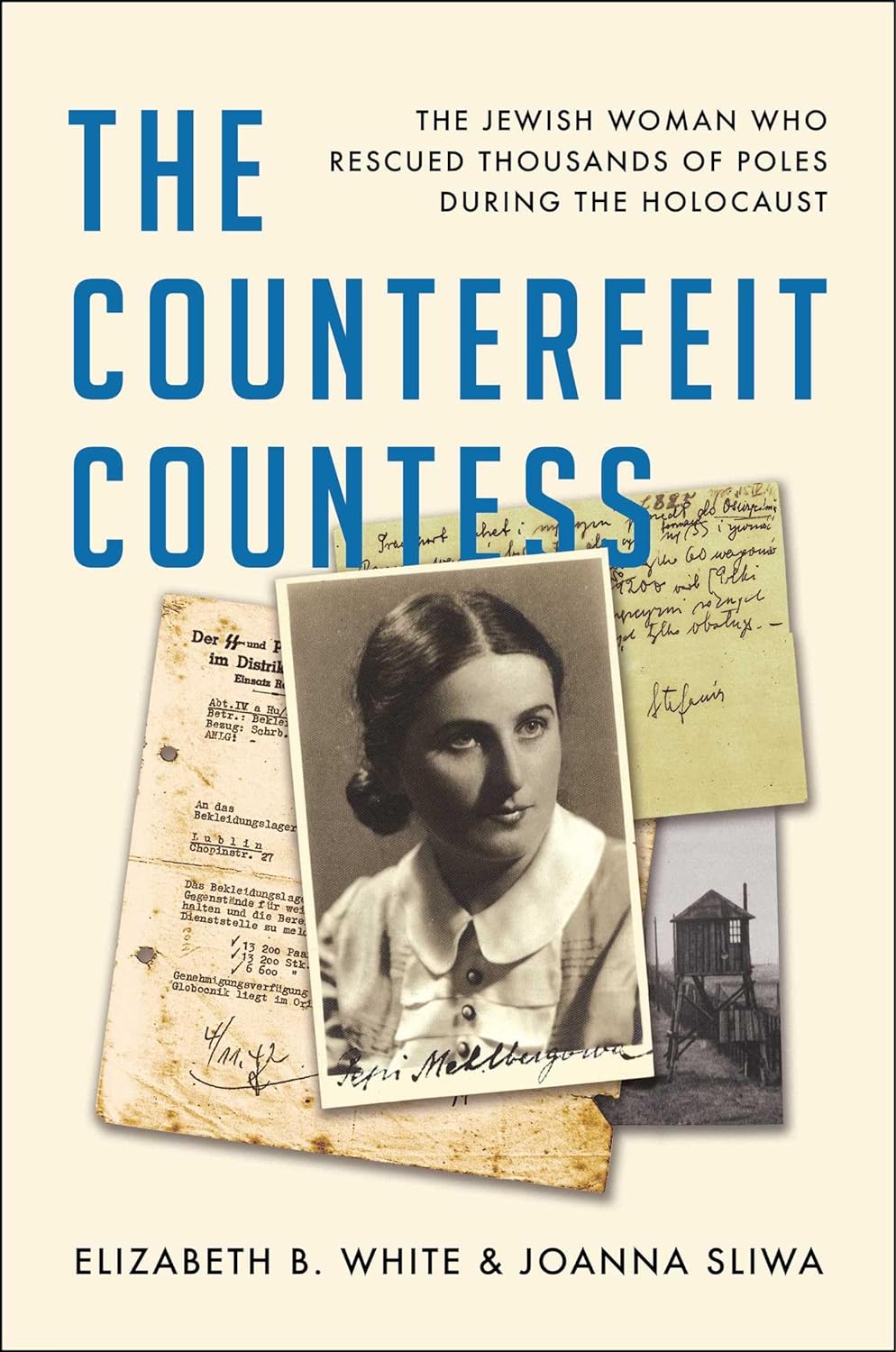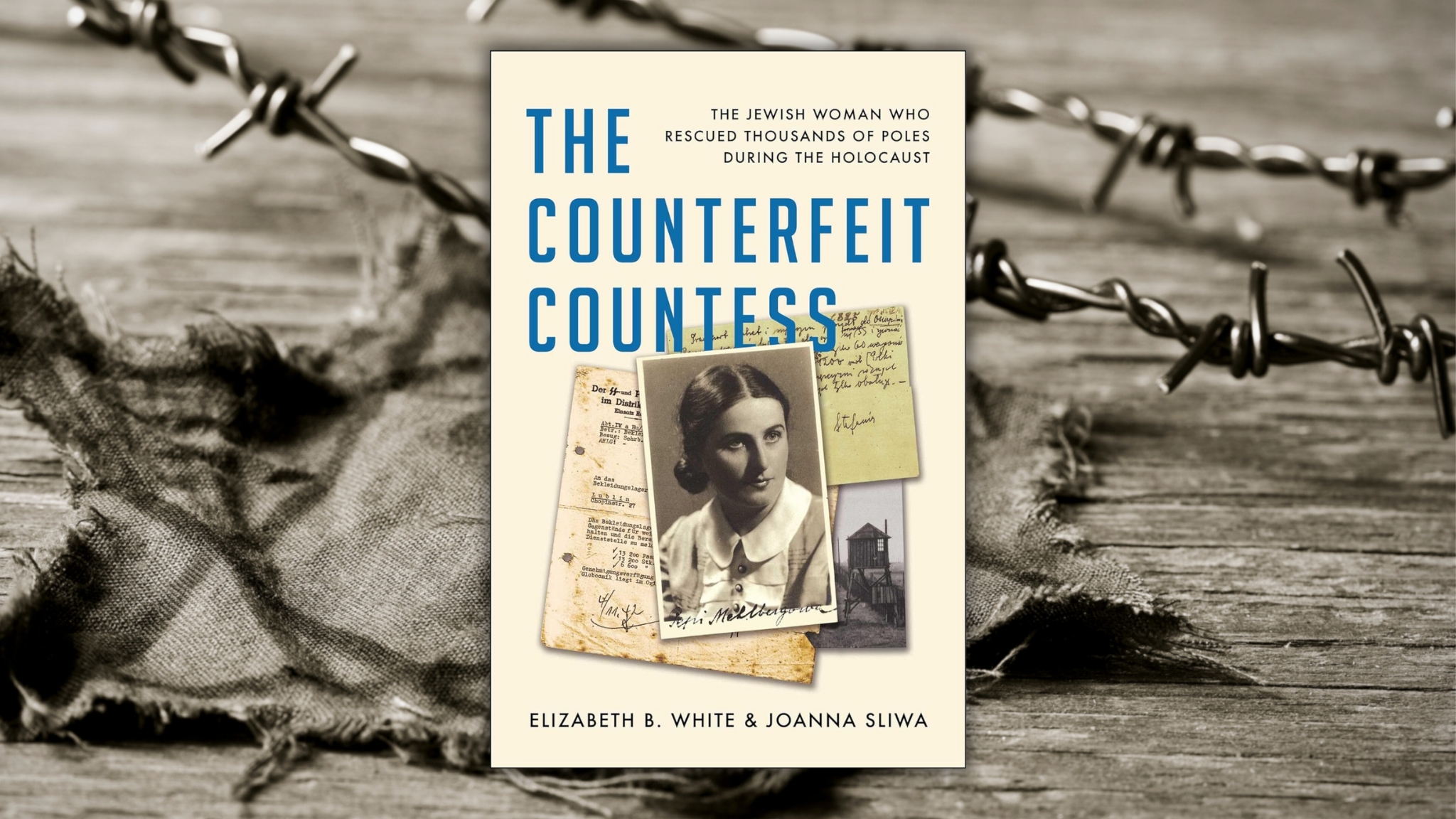The Counterfeit Countess by Elizabeth B. White and Joanna Sliwa
What's It About?
The astonishing story of Dr. Josephine Janina Mehlberg — a Jewish mathematician who saved thousands of lives in Nazi-occupied Poland by masquerading as a Polish aristocrat — drawing on Mehlberg’s own unpublished memoir.Elizabeth B. White and Joanna Sliwa are historians, Holocaust scholars and co-authors of The Counterfeit Countess, subtitled The Jewish Woman Who Rescued Thousands of Poles During the Holocaust. They are to be congratulated for recognizing the significance of an unpublished memoir and bringing to light Janina Mehlberg’s extraordinary efforts to improve and save Polish lives during the WWII Nazi occupation.
This powerful work of non-fiction at long last reveals the stunning true story of Dr. Josephine Janina Spinner Mehlberg (May 1, 1905 – May 26, 1969), a previously unknown courageous Jewish heroine of the Polish Resistance who saved as many as 10,000 predominantly Roman Catholic Polish prisoners from almost certain death in the Majdanek concentration camp.
One Fearless Woman’s Mission
The late Dr. Mehlberg, a proud Polish patriot, is now being lauded as the Jewish Schindler. This daring, intellectually gifted mathematician successfully masqueraded as a member of the Polish aristocracy for the duration of WWII and the Nazi occupation by assuming the identity of fictional Countess Janina Suchodolska. She swore a loyalty oath to become a valued member of the clandestine Armia Krajowa (AK), the largest Polish resistance organization, and became a social services relief officer with RGO (Rada Główna Opiekuńcza), the Central Welfare Council.
RGO was officially permitted by the Nazi Government to provide basic needs such as food, shelter, clothing, medicines and care packages to displaced Polish citizens as well as Polish POWs for the duration of WWII. It operated primarily through the dedicated work of volunteers. Countess Suchodolska succeeded, in part by not taking “no” for an answer and especially for her courage in standing up to the highest-ranking Nazi bullies.
Her fearlessness, elegant aristocratic bearing, tenacity and ability to speak perfect German (as well as Polish, French, Russian and English) impressed the three successive Camp Commandants of Majdanek she convinced to allow the RGO to provide sustenance to the Polish inmates. The Countess persuaded them they would have a more productive workforce if they had healthier, better-fed laborers.
Idyllic Upbringing and Marriage
Janina Mehlberg nee Spinner was born in 1905 in Eastern Galicia (then in Poland and now in Ukraine) to an intellectual, wealthy, secular Jewish family who considered themselves to be loyal Poles. Janina “Pepi” Spinner was a brilliant student as well as a petite, pretty and well-dressed young woman with superb manners. Her mother encouraged Pepi’s scholarship after her father’s death in WWI.
She matriculated at Jan Kazimierz University in Lwów (now Lviv), excelling in mathematics courses while earning a doctorate in philosophy and meeting fellow student and future husband Henry Mehlberg. They married in 1933 and remained in Lwów where Dr. Henry Mehlberg taught philosophy at the university and Dr. Janina Mehlberg taught high school math.
These were the lamentably brief halcyon years. Their lifestyle was disrupted in 1939 by the totalitarian Soviet occupation of the region. This was soon replaced by the even worse Nazi oppression and Jewish persecution when German troops seized the city in 1941.
Fleeing Nazi Oppression
Immediately, the Nazis began seizing and killing Jewish professors, instructors and students as well as other members of the intelligentsia. They simultaneously began to create a ghetto in Lwów to conveniently contain Jews of all ages in preparation to execute them in situ or transport them to extermination camps.
When Henry and Janina received orders to move to the ghetto they were fortunate to receive invaluable assistance from their dearest friend Count Andrzej Skrzyński. At great personal risk, he provided them with false identity papers and travel passes and accompanied them on a perilous three-day train journey to Lublin which would become their home for the duration of the war.
Their Jewish origins were erased as they became Count Piotr Suchodolski and his lovely wife, Countess Janina Suchodolska. Count Skrzyński secured them lodging with two elderly sisters, genuine aristocrats, who had been ousted from their estate. He also provided introductions to the Polish Resistance and RGO. Henry took a low-key job in agriculture outside of the city while Janina worked with RGO to improve social welfare for the Polish POWs in nearby Majdanek.
Saving Thousands of Polish Lives
In addition to helping to prepare nourishing soups, breads and other staples, she personally was on hand to deliver the food and medicines, further risking her life by passing messages to resistance members in the camp. Following this, she pressed for the release of Polish inmates unfit for work including orphans, chronically ill adults and the disabled with the stipulation the RGO would be responsible for the costs and their care.
During the course of their research, authors Elizabeth B. White and Joanna Sliwa were able to verify and document the successful negotiation of The Counterfeit Countess for the release of over 9700 Poles.
It was far too risky for the Mehlbergs to reveal to anyone, including fellow members of the resistance organization or RGO during and after the war ended, either their true identity or their Jewishness. Many members of the AK would have readily turned them into the Nazis.
Post-War Troubles
Post-war, danger continued with the Soviet governance of Poland. Many of these oppressors were not only anti-Semitic but also knew the AK Home Army had been supporters of the Polish government exiled in England.
Despite the tremendous welfare benefit the RGO had provided, many of their leaders suffered cruel and perfidious persecution by being charged as Nazi collaborators by the very Poles they had helped. The ineffectual Polish Red Cross was erroneously awarded credit for much of the beneficial work done by the RGO for Polish POWs.
The couple was separated for extended time periods during WWII and until 1950 when through an elaborate ruse they were able to permanently escape Poland and immigrate to America. Janina Mehlberg became a tenured Professor of Mathematics at the Illinois Institute of Technology while Henry became a Professor of Philosophy at University of Chicago.
Telling Her Story
She wrote her memoir shortly before her death in 1969. Henry translated the manuscript and attempted unsuccessfully to have it published. Prior to his death in 1979, he entrusted it to a colleague, Professor Arthur Funk, who taught history at the University of Florida. Dr. Funk was likewise unable to find a publisher but fortunately passed the manuscript on to Elizabeth B. White in 1989 at a conference. Sadly, he passed away in 2007 before serious research began to verify the authenticity of Janina’s memoir.
In lieu of recounting her personal history in her manuscript, The Counterfeit Countess had focused instead on conveying the full horror the prisoners endured at the hands of the Nazis in Majdanek Concentration Camp.
It would be nearly three decades before Dr. White would be able to focus on this compelling manuscript entrusted to her. This historian and now retired Research Director for the United States Holocaust Memorial Museum’s Center for the Prevention of Genocide is not fluent in the Polish language. Both Dr. Henry Mehlberg and Dr. Arthur Funk were dead and the extremely limited personal information presented made it nearly impossible to confirm Janina Mehlberg’s memoir or indeed, any biographical details prior to her immigration to America.
A Remarkable, Unlikely Heroine
Fortunately, she sent a copy of the memoir to Dr. Joanna Sliwa, a renowned Polish Holocaust expert, academic scholar, college instructor and historian at the Conference on Jewish Material Claims against Germany (Claims Conference) in New York.
They agreed to collaborate on the initial project to verify this haunting and seemingly important unpublished memoir. The note section and bibliography concluding The Counterfeit Countess attests to their four years of extensive research despite work and family obligations, a pandemic and war in Ukraine which prevented travel as well as a lack of expert knowledge of the Polish language.
They augmented their own research by hiring genealogists and historical researchers in Poland and when possible in Ukraine in order to make this work of nonfiction available and to share the courageous story of this remarkable, unlikely heroine with the world. Highly recommend to anyone interested in WWII and Holocaust history and indebtedness is due for the scholarship and dedication of Elizabeth B. White and Joanna Sliwa.
A Few Notes About Majdanek Concentration Camp
In response to the orders of Heinrich Himmler, the Majdanek concentration camp was built in October 1941 on the outskirts of Lublin, Poland. Its purpose was to exterminate Jews, provide forced labor through Polish and other nationalities’ POWs, and to serve as one of three major sorting and warehouse facilities for possessions seized from Jews upon arrival at this and many of the other concentration/extermination camps located in Poland, Ukraine, Germany and Austria.
The first inmates were Soviet POWs who soon died of starvation and exposure. The next prisoners were primarily Bohemian and Czech Jews, murdered in the nearby forest by firing squads. Operated by the SS, it was among the largest of the Nazi concentration camps which encompassed over 200 structures, 7 gas chambers, gallows and mobile gas killing units.
In less than four years, approximately 500,000 prisoners from 28 countries and many nationalities passed through the camp. An estimated 360,000 inmates died there; about 60% from diseases, beatings or by starvation with the remaining 40% murdered. Others died or were killed in transport to other camps. Although the capacity was larger, there were seldom more than 20,000 prisoner/laborers housed at any given time. Chronic typhus outbreaks and death from overwork or starvation took their toll on the POWs as well as the Jewish forced laborers. As many as a quarter of the inmates were non-Jewish Poles whose treatment was only marginally better than those destined for extermination.
Gas chambers were built and began operation in September 1942 which effectively eliminated the majority of the Jewish population. On November 3, 1943, not long after Countess Suchodolska initiated the supplementary feeding program for the Polish inmates, the largest mass execution of Jews took place. Over 18,000 Jews housed in Majdanek and other Lublin area camps were trucked to a forested area, shot to death in large execution ditches and buried there.
Also beginning in the fall of 1943, Poles suspected of being resistance members or spies were transported from the nearby Gestapo prison in Lublin Castle to Majdanek for execution. Surviving eyewitnesses testified postwar that SS guards would shoot prisoners purely for entertainment.
Majdanek was liberated by the Soviet Red Army on July 22, 1944, six months before the liberation of Auschwitz and ten months before American and British troops liberated camps in Germany and Austria. Only a few hundred Jewish prisoners were found alive.
Knowing the Red Army was approaching, the German staff and guards had hastily burned documents and several buildings and destroyed the large crematorium before fleeing. Even so, it was impossible for them to erase the ample evidence of their inhumanity. The Soviets founded The State Museum at Majdanek in Lublin in November 1944. It is the oldest museum institution to commemorate the victims of World War II.
 About Elizabeth B. White and Joanna Sliwa:
About Elizabeth B. White and Joanna Sliwa:
Dr. Elizabeth “Barry” White recently retired from the United States Holocaust Memorial Museum, where she served as historian and as Research Director for the USHMM’s Center for the Prevention of Genocide. Prior to working for the USHMM, Barry spent a career at the US Department of Justice working on investigations and prosecutions of Nazi criminals and other human rights violators. She served as deputy director and chief historian of the Office of Special Investigations and as deputy chief and chief historian of the Human Rights and Special Prosecutions Section. She lives in Falls Church, Virginia.
Dr. Joanna Sliwa is a historian at the Conference on Jewish Material Claims Against Germany (Claims Conference) in New York, where she also administers academic programs. She previously worked at the American Jewish Joint Distribution Committee, and at the Museum of Jewish Heritage—A Living Memorial to the Holocaust. She has taught Holocaust and Jewish history at Kean University and at Rutgers University and has served as a historical consultant and researcher, including for the PBS film In the Name of Their Mothers: The Story of Irena Sendler. Her first book, Jewish Childhood in Kraków: A Microhistory of the Holocaust, won the 2020 Ernst Fraenkel Prize awarded by the Wiener Holocaust Library. She lives in Linden, New Jersey.





